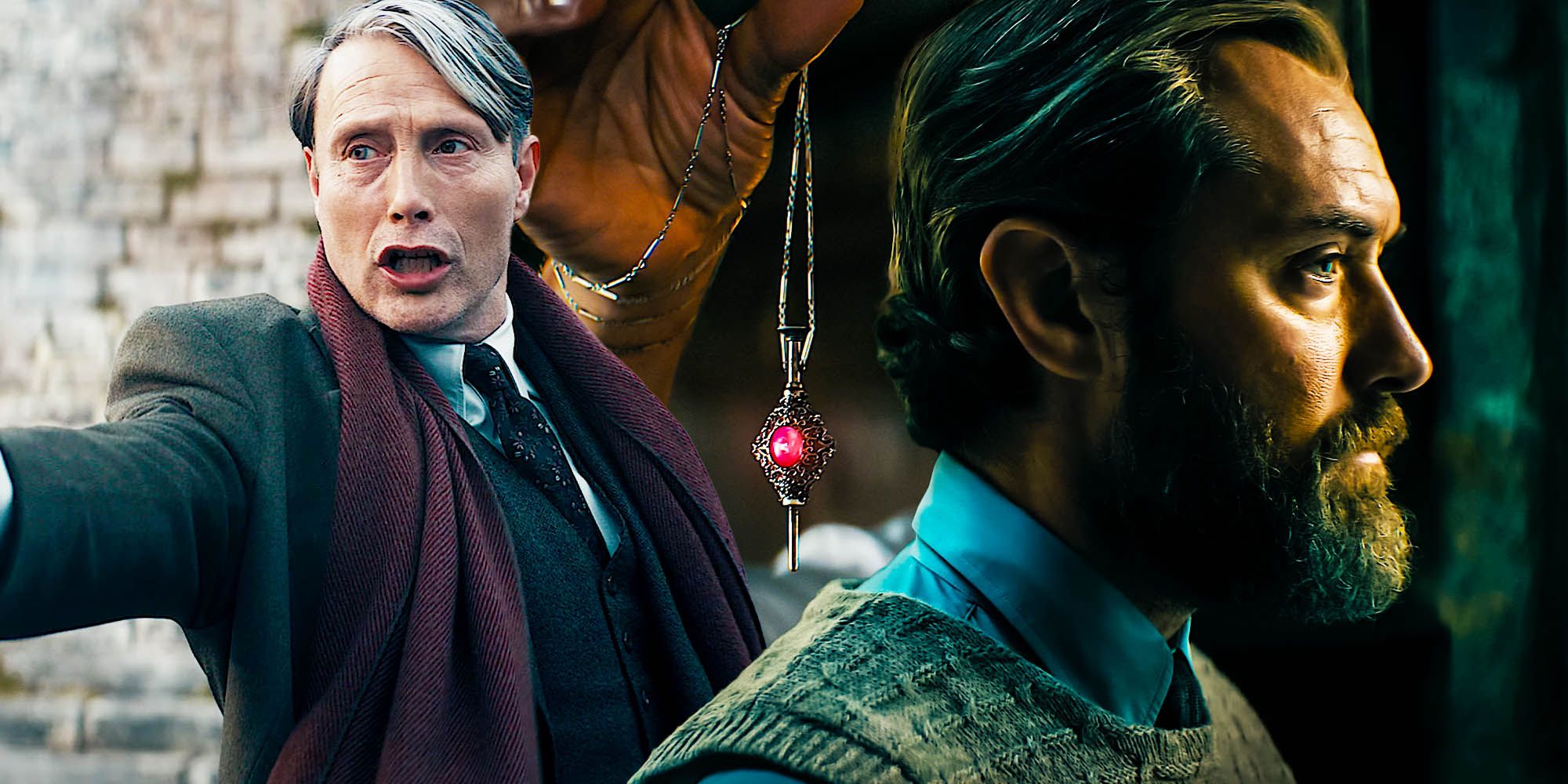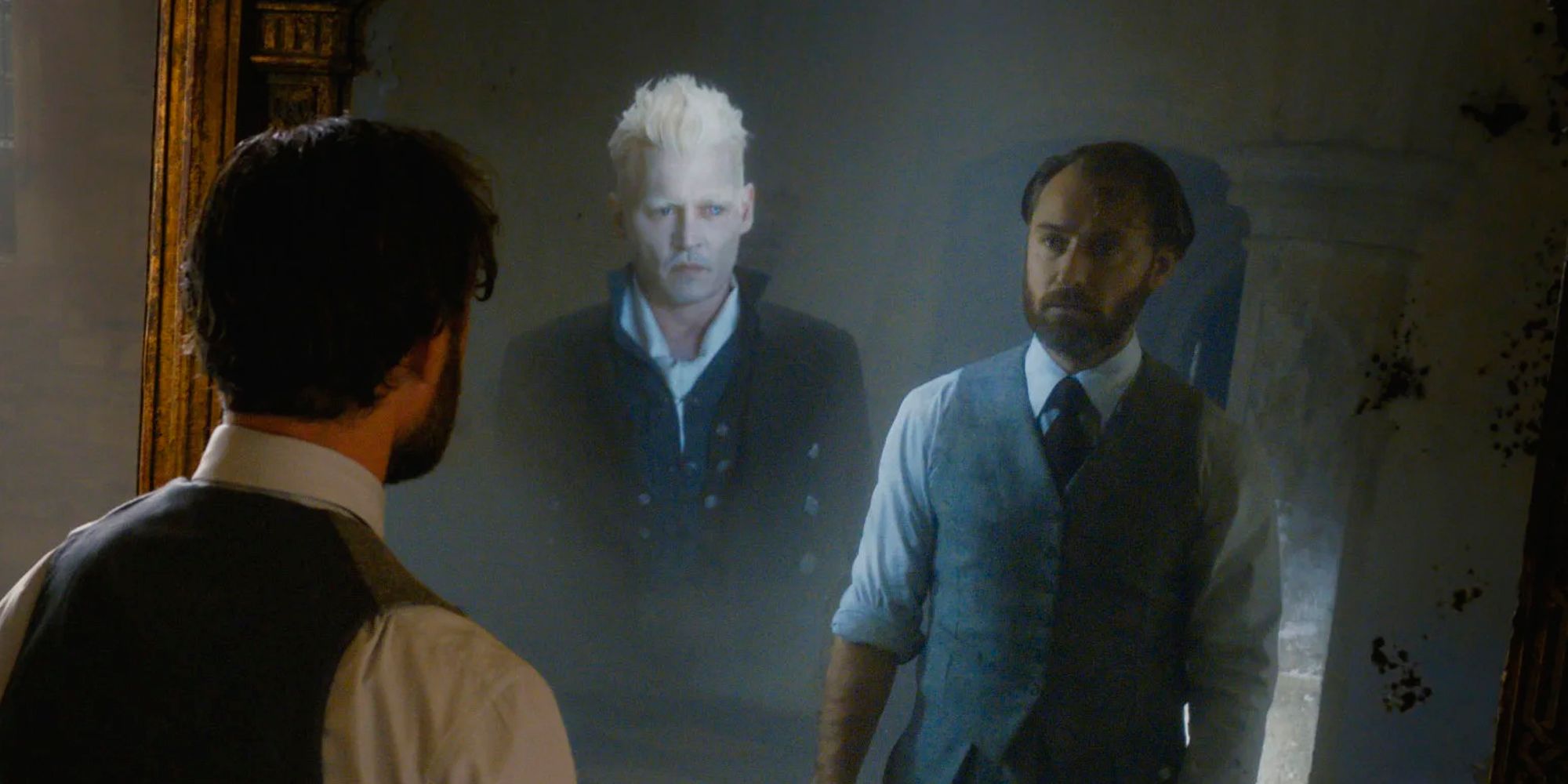Dumbledore's (Jude Law) blood pact with Gellert Grindelwald (Mads Mikkelsen) in the Fantastic Beasts saga makes the Hogwarts headmaster's conflict with the dark wizard worse - here's why. Fans have known for a while that the five-movie series is building up to the legendary duel between Grindelwald and Dumbledore in 1945. But Fantastic Beasts: The Crimes of Grindelwald confirmed that, for now, Dumbledore couldn't fight Grindelwald due to a blood pact the two made when they were young.
Throughout Fantastic Beasts 2, the Ministry of Magic approaches Dumbledore and asks him to take the fight to Grindelwald, which he refuses repeatedly. The Ministry becomes suspicious of Dumbledore, believing that he may still be sympathetic to Grindelwald's cause. Eventually, it's revealed that it's a blood pact vial that is keeping Dumbledore physically from fighting his friend-turned-foe Grindelwald. This is why Grindelwald has rallied Credence (Ezra Miller) to his cause, while Dumbledore brought Newt (Eddie Redmayne) to his side. But the Fantastic Beasts 2 ending proves Dumbledore's blood pact can be broken, as Newt steals Grindelwald's vial (via Niffler) and hands it to Dumbledore, in the hope that he can find a way to destroy it. Harry Potter fans know he will somehow, as he will face Grindelwald in the famous 1945 duel.
Dumbledore's blood pact with Grindelwald minimizes Dumbledore's deeper, more complex inner conflict, which makes him reluctant to fight Grindelwald. Dumbledore was once very close to Grindelwald (as the Mirror of Erised shows), and their history together means Dumbledores still has complicated feelings for him. Furthermore, confronting Grindelwald also means facing the day that Ariana Dumbledore died. Ariana's death is Dumbledore's darkest secret, and the Harry Potter universe still hasn't confirmed whose wand killed her during the threeway duel in 1899 (Albus', Aberforth's, or Grindelwald's). Albus Dumbledore might be consciously avoiding meeting Grindelwald again as he doesn't want to know (or confirm) who killed his little sister, as he has been bearing the guilt over her death for all his life (as he tells Leta Lestrange in Fantastic Beasts 2). Dumbledore's inability to fight Grindelwald physically because of an object (the blood pact vial) makes his inner conflict less important when this should be the main conflict explored in Fantastic Beasts: The Secrets of Dumbledore.
Similar to Ron destroying the Horcrux locket in Deathly Hallows, Dumbledore will likely have to work through his emotions to break down the blood pact in Fantastic Beasts 3 (a simple spell won't be enough). This is the only way the blood pact story can still respect the deeper reasons behind Dumbledore’s reluctance to fight Grindelwald. In the end, managing to overcome his worst fears (killing Ariana) and memories (believing in Grindelwald) is a much more difficult task for Dumbledore than actually fighting Grindelwald face-to-face (as Percy Weasley perfectly puts it, he is, after all, the "best wizard in the world").
Fantastic Beasts: The Secrets of Dumbledore promises from its very title to deliver on Dumbledore and Grindelwald's complicated relationship. If Fantastic Beasts 2 was more Grindelwald-centered, the third movie is bound to explore the Dumbledores (including the big Credence/Aurelius Dumbledore twist). Developing on Dumbledore's complicated feelings for Grindelwald and on the horror of losing his sister (that he is reliving through his current war against Grindelwald) will do justice to Dumbledore's conflict and remove the potential damage the blood pact storyline has caused in the Fantastic Beasts series.



